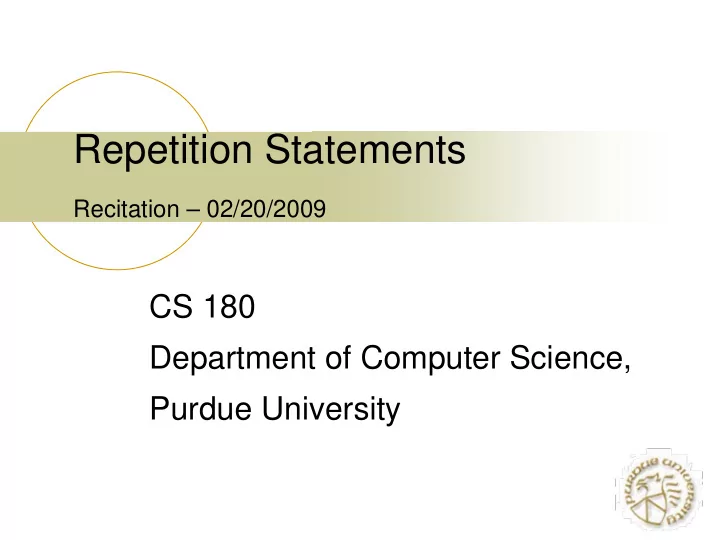

Repetition Statements Recitation – 02/20/2009 CS 180 Department of Computer Science, Purdue University
Announcement � Grades are out: � Project 2, 3 � Lab 2, 3, 4, 5 � Project 4 is due on Feb 25 th
Syntax for Three Forms of Loops � while loop while ( <boolean expression> ) <statement block> � do-while loop do <statement> while ( <boolean expression> ) ; � for loop for ( <initialization>; <boolean expression>; <increment> ) <statement> 3
Control Flow of while Boolean Expression while ( number <= 100 ) { sum = sum + number; previous statement; number = number + 1; } Statement int sum = 0, number = 1 (loop body) true sum = sum + number; number <= 100 ? number = number + 1; false next statement; 4
Control Flow of do-while Statement previous statement; (loop body) do { sum += number; int sum = 0, number = 1 number++; } while ( number <= 100 ); sum += number; number++; Boolean Expression true number <= 100 ? false next statement; 5
Control flow of for Boolean Initialization Increment Expression previous statement; for ( number=1,sum=0 ; number<=100 ; number++ ) { number=1,sum=0; sum += number; } number<=100? true false Statement (loop body) sum += number; next statement; number++; 6
Choosing a Loop � If you know how many times the loop will be iterated, use a for loop . � If you don’t know how many times the loop will be iterated, but � it could be zero, use a while loop � it will be at least once, use a do-while loop . 7
Example 1 � The charAt( int ) method of the String class returns the character at the given index of an instance. public String someMeth1( String str ) { String result = ""; for ( int index = str.length() - 1; index >= 0; --index ) { result += str.charAt( index ); } return result; } What is the result of: someMeth1( "somewhere i have never traveled" ) 8
Example 2 public void someMeth2() { String name = ""; Scanner keyboard = new Scanner( System.in ); do { System.out.print( "Please enter a name or \"quit\" to exit: " ); name = keyboard.next(); System.out.println( "Howdy "+name+"!" ); } while ( !name.equals( "quit" ) ); } How does the above compare to using a while loop? Is a for loop appropriate? 9
Example 3 public void someMeth3() { String name = ""; Scanner keyboard = new Scanner( System.in ); while ( true ) { System.out.print( "Please enter a name or \"quit\" to exit: " ); name = keyboard.next(); if ( !name.equals( "quit" ) ) System.out.println( "Howdy "+name+"!" ); else break; } } Does the above loop terminate? How does this compare to someMeth2 ? 10
Example 4 public void someMeth4() { String name = ""; Scanner keyboard = new Scanner( System.in ); S.o.p( "Please enter a name or \"quit\" to exit: " ); name = keyboard.next(); while ( !name.equals("quit") ) { S.o.pln( "Howdy "+name+"!" ); S.o.p( "Please enter a name or \"quit\" to exit: " ); name = keyboard.next(); } } Notice that this has a cleaner flow than example 3. Priming the loop can avoid extra cases and bugs. 11
Example 5 public void someMeth5() { Scanner keyboard = new Scanner( System.in ); while ( true ) { switch( keyboard.nextInt() ) { case 0: case 1: case 2: System.out.println( "In here" ); break; case 3: case 4: case 5: System.out.println( "Somewhere else" ); continue; } System.out.println( "After Switch" ); } } How does this loop behave when 7 is entered? 3? 0? 12
Example 6 public void someMeth6() { for ( int i = 0; i < 5; ++i ) { for ( int j = 5-i; j > 0; --j ) System.out.print( "*" ); System.out.println(); } } Notice how loops within loops can interact. What does each loop correspond to? Notice how using a table can help you execute this manually. 13
Example 7 public void someMeth7() { for ( int i = 0; i < 5; ++i ) { for ( int j = 5-i; j > 0; --i ) System.out.print( "*" ); System.out.println(); } } What happens here? Where is the mistake? 14
Example 8 public void someMeth8() { for ( int i = 0; i < 5; ++i ) { for ( int j = 5-i; j > 0; --j ) System.out.print( "*" ); --i; System.out.println(); } } How does this behave? 15
Example 9 public void someMeth9() { int sum = 0; for (int count=1; count<5; count++) System.out.println(“Count:” + count); sum = sum + count; System.out.println(“Sum: ” + sum); } How does this behave? What have we forgotten? 16
Example 10 public void someMeth10() { int sum = 0; for (int count=1; count<5; count++); { System.out.println(“Count:” + count); sum = sum + count; } System.out.println(“Sum: ” + sum); } How about this one? 17
Quiz � What is the difference between break and continue ? � Are the different forms of loops equivalent? 18
Recommend
More recommend